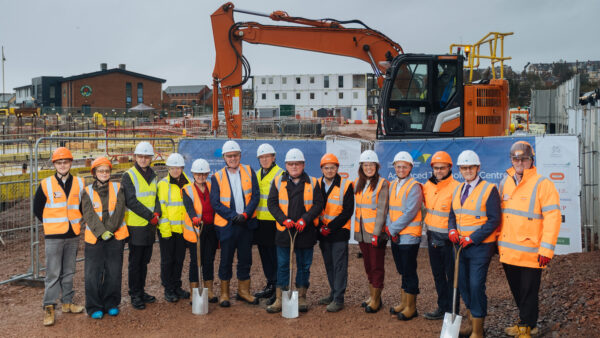
Image: Dreamstime/Alancotton
Following Chancellor Rishi Sunak’s first Budget speech yesterday, in which he pledged billions of pounds worth of infrastructure investment and measures to ease pressure on businesses amid the coronavirus outbreak (see the main points here), figures from across the construction industry gave their reaction:
“We understand that abolishing the Red Diesel tax relief is an effort to meet climate change targets, however changing the rates of tax could have a disproportionate and costly impact on the construction sector, which contributes significantly to GDP.
“In his statement, the Chancellor said he will consult with other sectors on the impact this could bring and we encourage him to work with us and the built environment to minimise the effects this could have on construction when it is brought into legislation in 2 years’ time.”
— Eddie Tuttle, director for policy, research & public affairs at the Chartered Institute of Building (CIOB). For the CIOB’s full Budget reaction, click here.
“It is now clear that the impact of the coronavirus on the UK economy and construction sector is likely to be very significant. We welcome the Chancellor’s plans to reduce the impact of the virus on small businesses, including a refund for statutory sick pay and business interruption loan scheme.
“However, in the construction and infrastructure sectors the costs of any significant disruption to project delivery is likely to far exceed the benefits of these measures and could see many firms unable to fulfil their financial commitments. Although it is substantial, the Chancellor’s proposed stimulus is unlikely to be enough to prevent irreparable damage to our industry – which in turn will drive up the costs and risk of major project delivery across the UK.
“Businesses of all sizes need to carefully review their contingency plans to ensure that they are as prepared as possible – and Government must be prepared to work closely with our industry over the next few months to prevent disruption to the delivery of vital housing, energy and infrastructure projects across the UK. This is an exceptional situation that demands an exceptional response.”
— Mark Reynolds, chief executive, Mace Group
“I think we have to tip our hat at the chancellor, he is getting things done – this was a Budget for business and the people, the tone was optimistic and inspired hope. The £175bn investment in infrastructure is tangible and, at least in part, it has allayed some of the concerns that the coronavirus creates. Particularly announcements on SSP are encouraging and ensure is quantifiable and helpful. Access to credit will no doubt help.
“Having been calling for a Building Safety Fund for some 2 years now, it is encouraging to hear that the ACM cladding fund is being extended to look more holistically at this. We look forward to learning more about how this will work. My concern is that on the surface it doesn’t go quite as far as ideally we’d like, but will respond more fully on this once”.
— Iain McIlwee, CEO, FIS
“The promised investment will create the need for tens of thousands more workers in Britain’s construction sector. This will require a major upturn in the number of apprentices and trainees; government will need to work closely with industry to deliver this.
“The huge pipeline of work will provide a unique opportunity for government to drive modernisation in how we build, encouraging the adoption of Modern Methods of Construction that will improve productivity in a much tighter labour market.”
— Steve Radley, policy director, CITB
“The Chancellor was entirely selective with his statistics in suggesting that off-road red diesel users were responsible for 10% of air pollutants. Ironically, motor vehicles, as the much bigger polluters, will face no tax hike and drivers will continue to pay about 10% less for their fuel compared to the start of the year. The CEA is justifiably proud that its members have reduced harmful engine emissions by over 90%, which coupled with improved fuel consumption is a “green” success.
“Government has promised to consult on the application of this tax change and the CEA looks forward to being part of this process, particularly in support of plant hire companies and contractors who will be alongside us in delivering the promised infrastructure revolution.”
— Rob Oliver, chief executive, Construction Equipment Association (CEA)
“Today’s Budget came on the day that figures published by the ONS show a 1.4% increase in construction output in the three months to January 2020. This is great news and the Chancellor’s announcement of a huge investment in infrastructure, plus enhanced spending on housing, and other measures to support our sector are welcomed. However, one should not be blind to the potential impact of Coronavirus on, not only construction, but the global economy as a whole. These are uncertain times.”
— Graham Harle, CEO, Gleeds
“This Budget rightly recognises the role infrastructure plays in transforming communities. However, there is much detail missing on key pledges and many postponed decisions, including the long-awaited publication of the National Infrastructure Strategy.
“This Strategy is essential if the investment promised today is to address the needs of the country and the economy of the future. While Covid-19 is the immediate threat and understandably the Chancellor’s priority, good strategic infrastructure has the potential to deliver growth and resilience for the UK over the longer term, so we need swift action in the days and months ahead.”
— Chris Richards, head of policy and public affairs, Institution of Civil Engineers
“Coronavirus threatens to seriously impact the construction industry if workers have to self-isolate, so the commitment to refund sick pay payments for firms with fewer than 250 staff on sick pay payments will help many small construction companies, as will the assistance for those who need a deferral period on their tax liabilities to see them through any instability.
“The construction industry will also applaud the commitment to spend over £600bn on infrastructure over the next five years, which includes a £10.9bn increase in housing investment and target of 300,000 new homes a year – although we wait to see the further detail of these plans.
“In particular, we would have liked to see the Chancellor go further than announcing a £400m brownfield fund to support the development of new homes: a review of the greenbelt would have been a bolder step.”
— Clive Docwra, managing director, McBains










